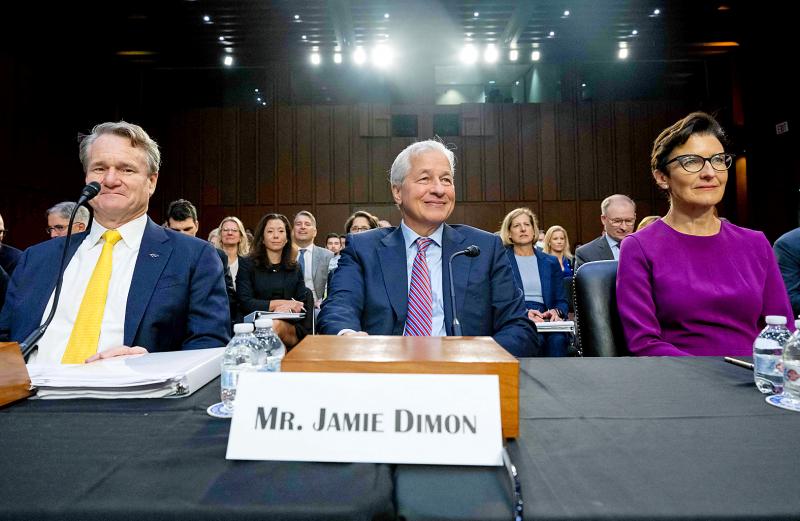The heads of three major US banks on Wednesday pledged that they would withdraw from the Chinese market if Washington imposed sanctions on Beijing in response to an invasion of Taiwan.
JP Morgan Chase chairman and CEO Jamie Dimon, Bank of America chairman and CEO Brian Moynihan and Citigroup CEO Jane Fraser told lawmakers at a hearing of the US House of Representatives Committee on Financial Services in Washington that the three banks would follow the guidance of the US government to exit China if necessary.
The three bankers made the pledge after US Representative Blaine Luetkemeyer asked the three if they would pull their investments out of China should the Chinese Communist Party follow through on its threat to invade Taiwan.

Photo: AFP
The US lawmaker spoke of Beijing’s continual threats toward Taiwan and its military exercises around Taiwan last month.
Citing the military actions of Russia against Ukraine, Luetkemeyer said there was a great risk in investing in “volatile nations with dictatorial governments” as financial institutions have played a significant role in supporting these regimes’ economies.
Moynihan said Bank of America had followed the government’s guidance to “work with China” in the past few decades, but if the US position changed, “we’ll immediately change it as we did in Russia.”
Dimon and Fraser agreed with Moynihan’s comments on following the government’s lead.
“We very much hope it doesn’t happen,” Fraser added.
Since Russia invaded Ukraine in February, the security situation across the Taiwan Strait has drawn increasing interest in the international community.
Fears over a possible invasion of Taiwan have been growing, in particular after US House of Representatives Speaker Nancy Pelosi made a 19-hour visit to Taipei early last month, which China strongly opposed.
Pelosi’s visit prompted China to launch several days of large-scale military exercises around Taiwan.
In a prerecorded interview with CBS’ 60 Minutes program that aired on Sunday, US President Joe Biden told host Scott Pelley that the US would defend Taiwan “if in fact there was an unprecedented attack.”

Beijing could eventually see a full amphibious invasion of Taiwan as the only "prudent" way to bring about unification, the US Department of Defense said in a newly released annual report to Congress. The Pentagon's "Annual Report to Congress: Military and Security Developments Involving the People's Republic of China 2025," was in many ways similar to last year’s report but reorganized the analysis of the options China has to take over Taiwan. Generally, according to the report, Chinese leaders view the People's Liberation Army's (PLA) capabilities for a Taiwan campaign as improving, but they remain uncertain about its readiness to successfully seize

Taiwan is getting a day off on Christmas for the first time in 25 years. The change comes after opposition parties passed a law earlier this year to add or restore five public holidays, including Constitution Day, which falls on today, Dec. 25. The day marks the 1947 adoption of the constitution of the Republic of China, as the government in Taipei is formally known. Back then the Chinese Nationalist Party (KMT) governed China from Nanjing. When the KMT, now an opposition party in Taiwan, passed the legislation on holidays, it said that they would help “commemorate the history of national development.” That

Taiwan has overtaken South Korea this year in per capita income for the first time in 23 years, IMF data showed. Per capita income is a nation’s GDP divided by the total population, used to compare average wealth levels across countries. Taiwan also beat Japan this year on per capita income, after surpassing it for the first time last year, US magazine Newsweek reported yesterday. Across Asia, Taiwan ranked fourth for per capita income at US$37,827 this year due to sustained economic growth, the report said. In the top three spots were Singapore, Macau and Hong Kong, it said. South

Snow fell on Yushan (Jade Mountain, 玉山) yesterday morning as a continental cold air mass sent temperatures below freezing on Taiwan’s tallest peak, the Central Weather Administration (CWA) said. Snowflakes were seen on Yushan’s north peak from 6:28am to 6:38am, but they did not fully cover the ground and no accumulation was recorded, the CWA said. As of 7:42am, the lowest temperature recorded across Taiwan was minus-5.5°C at Yushan’s Fengkou observatory and minus-4.7°C at the Yushan observatory, CWA data showed. On Hehuanshan (合歡山) in Nantou County, a low of 1.3°C was recorded at 6:39pm, when ice pellets fell at Songsyue Lodge (松雪樓), a